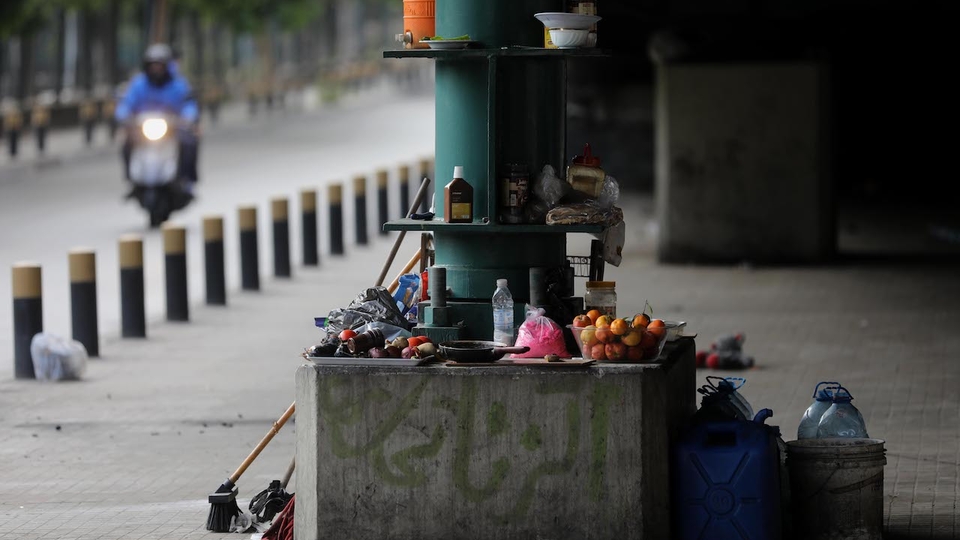Life on the Streets of Beirut
Lebanon’s economic collapse has deeply aggravated housing insecurity. There are no official statistics on homelessness, but housing rights activists say numbers are on the rise, especially in large cities, where half of all residents are renters.
Real estate speculation, combined with the absence of state policies to ensure housing as a basic right, created housing precarity well before the economic crisis. Then the severe disruption of economic activities and the loss of 95 percent of the value of the Lebanese pound has increased evictions exponentially, according to Public Works Studio, an independent research group whose Housing Monitor project tracks housing vulnerabilities in Lebanon.
Rent exceeds the minimum wage of L.L. 675,000 — which is yet to be officially adjusted despite modest unofficial increases — by over 60 percent, and only half of all households make more than the minimum wage. Moreover, with the collapse of the currency, landlords are demanding rent be paid in US dollars, an impossible ask for most tenants who still earn their wages in Lebanese pounds. Demanding payments in dollars for leases signed in liras is illegal. But “people are unaware of their rights and landlords may refuse lira payments, therefore breaking the law,” according to urban planner and researcher Jana Nakhal. “Even if a renter wants to seek legal protection, judges are on strike,” she adds.
The Beirut port explosion on August 4, 2020, was also a watershed event for housing in the neighborhoods most affected by the blast. Some landlords used the tragedy as an opportunity to evict longtime tenants, sometimes forcefully. Other residents, unable to afford repairs or bear the psychological trauma, left their homes permanently. Authorities failed to provide any alternative housing after the catastrophe.
State-led housing policies are needed to alleviate the housing crisis. “NGOs are able to secure external funding to create housing projects,” Soha Mneimneh, an urban planning researcher at the Beirut Urban Lab, says “but this does not negate the role of the government in changing housing policies.”
The housing crisis is particularly hard on social groups who already suffer from discrimination and marginalization, namely single mothers, women who live alone, people with disabilities, members of the LGBTQ communities, the elderly, refugees, and children. The Public Source asked six people to share their stories of how they ended up living on the streets of Beirut.
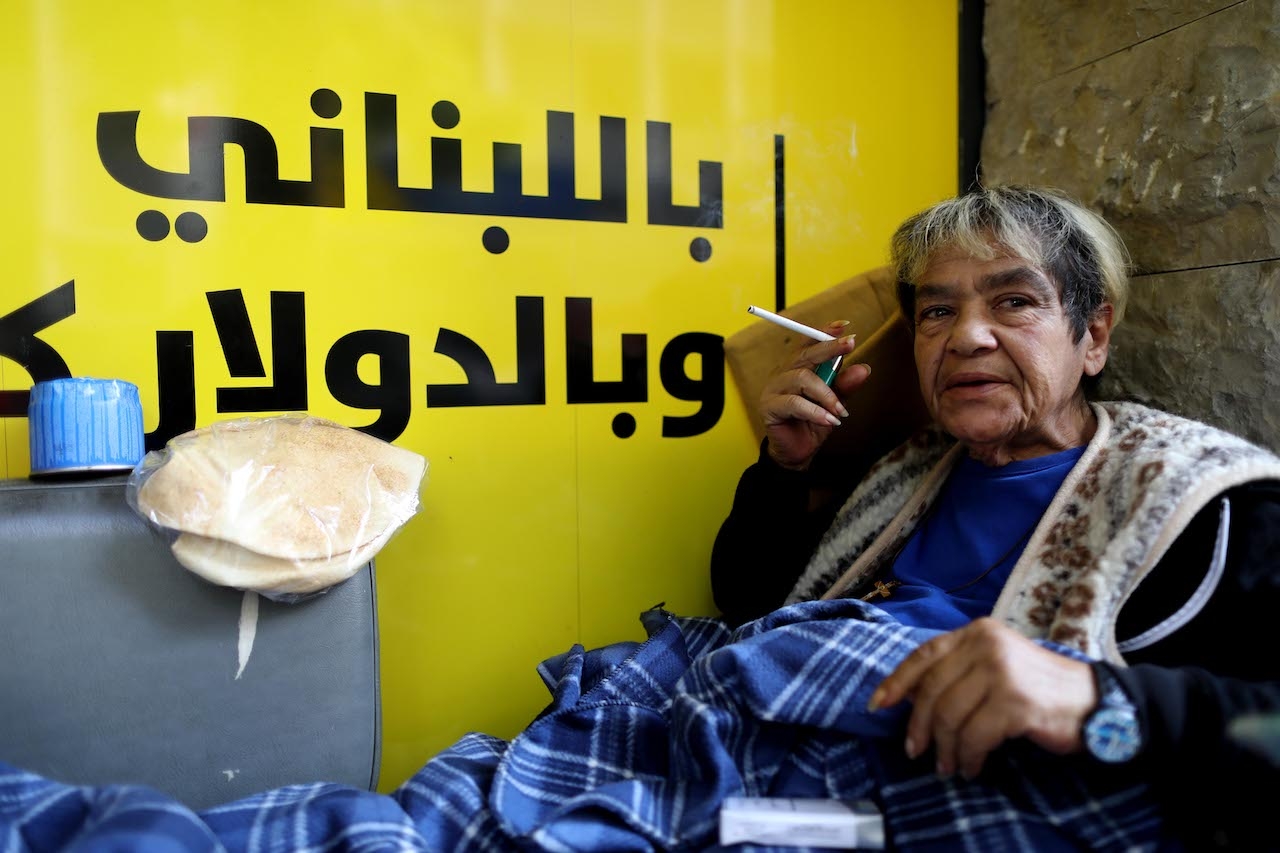
“I get cigarettes for free from people around here, some people also buy me coffee which I like to make in the morning and afternoon,” says Lisa Sahili, cigarette in hand. In the background, an ad by the money exchange service OMT reads: “In Lebanese liras and dollars too.” Achrafieh, Beirut. December 8, 2022. (Marwan Tahtah/The Public Source)
For 15 years, Lisa Antoun Sahili woke up at 4:30 a.m. to prepare the popular street food ka'ak and spent her day selling the handbag-shaped sesame-covered bread rolls until closing time at 6 p.m. On August 4, 2020, the Beirut port explosion destroyed her food cart. The blast also shattered the windows of her apartment in Sassine Square and damaged her furniture. At 65, she found herself unemployed and unable to afford home repairs, new furniture, or electric bills. The nonprofit organization Beit el Baraka helped with some of the home repairs, but she wasn’t able to replace her furniture.
Sahili now spends her days on a makeshift bench fashioned from four plastic chairs arranged along a storefront window. Every morning around 6 a.m., the Lebanese Red Cross accompanies Sahili to her apartment where she showers and gets dressed, then returns to her bench.
“I really value freedom,” says Sahili, remembering her ka'ak-selling days as fun and liberating. She had come to it after 32 years as a nurse, first at al-Roum Hospital during the civil war and later in the United States, where she spent 17 years as a geriatric nurse. She had returned to Lebanon when her mother got ill. Unable to find other work, she took on ka'ak.
“I want my 90-year-old mother to come live with me, but I don’t even have a sofa where she can sleep. It breaks my heart that she has to stay in my sister’s tiny house in the freezing village of Tannourine.”
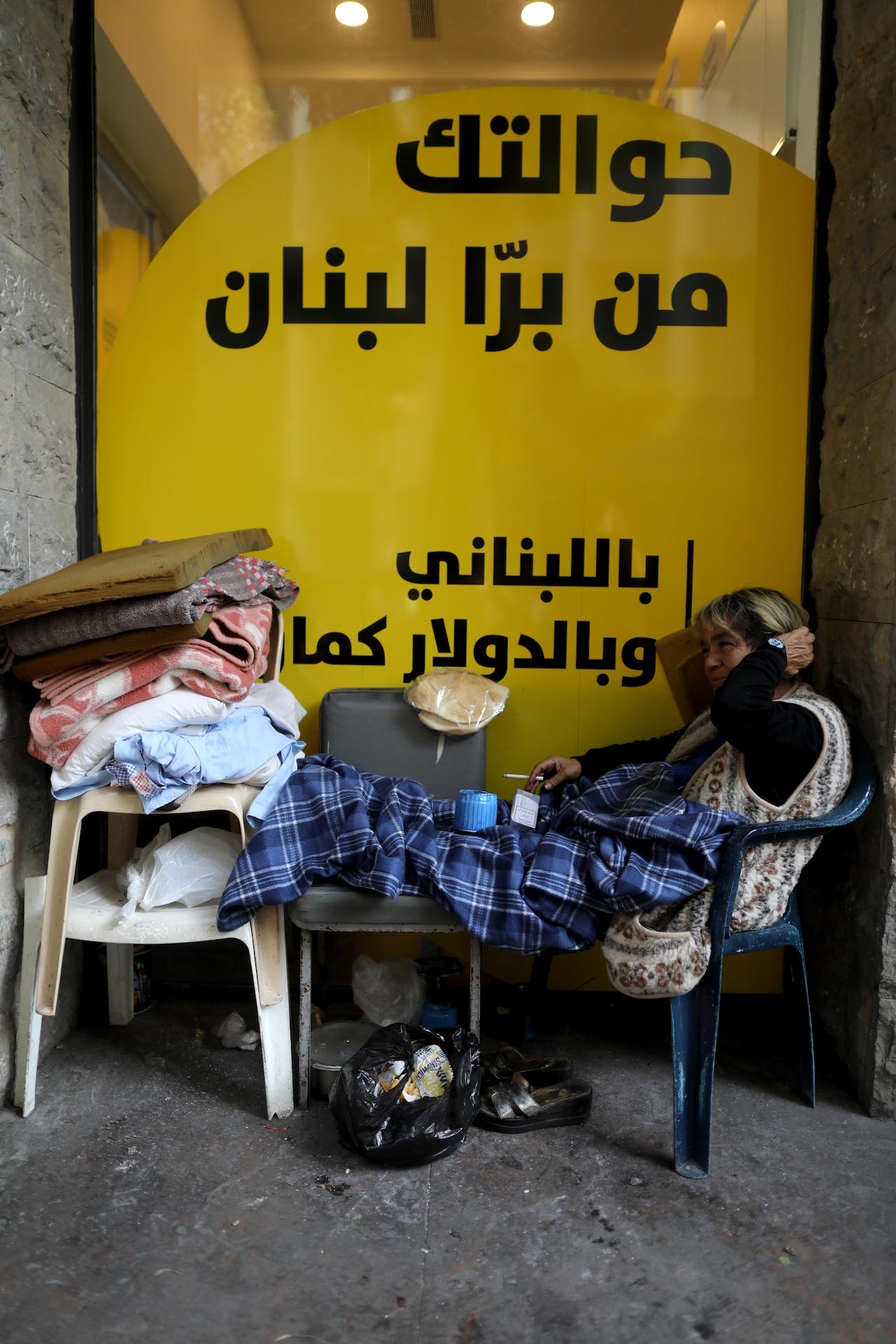
Lisa Sahili sits on the makeshift bench she has made her home. She keeps some clothes and winter blankets nearby, as well as a walking stick that doubles as a weapon against attackers. On the ground, she keeps a small canister, a food- heating pan, and a coffee pot for morning and afternoon brews. Achrafieh, Beirut. December 8, 2022. (Marwan Tahtah/The Public Source)
Sahili has diabetes and feels dizzy and nauseous most of the time. She also needs help standing, walking, and moving around, all the while her eyesight is quickly deteriorating. Passersby give her some food and cash. When nothing else is available, she eats bread with tomatoes.
“I don’t worry about being attacked here, but I was robbed of L.L. 5 million [around $100 at the time of writing] while sleeping, as well as my authentic Ray-Bans and a large gas canister that I dreaded losing,” says Sahili.
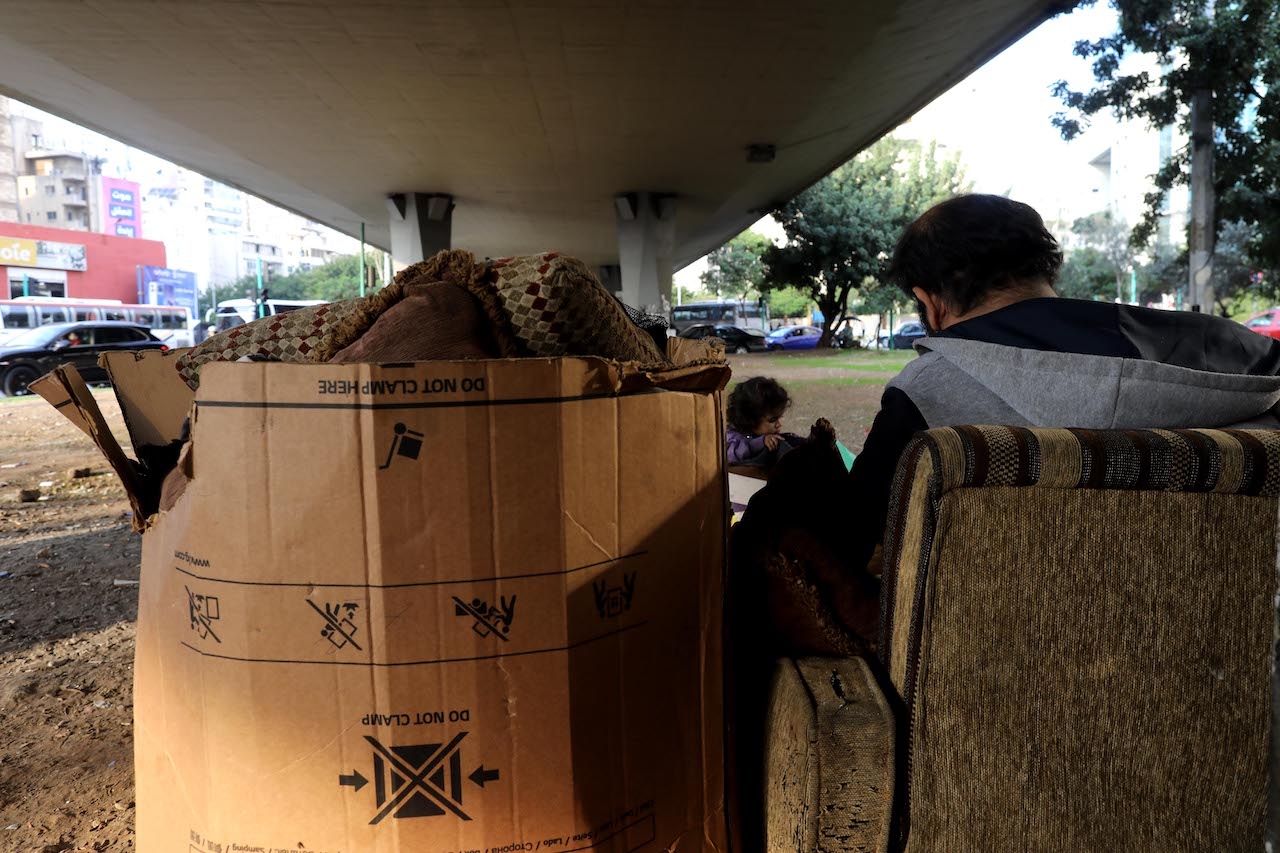
Imad Kanjo sits next to his youngest child under the Cola bridge. Cola, Beirut. December 8, 2022. (Marwan Tahtah/The Public Source)
Imad Kanjo, 43, has lived under the Cola bridge for over eight years, along with his seven children, five girls and two boys, aged between two and 18. They lost their apartment when Kanjo could no longer afford to pay rent.
Originally from the northern city of Tripoli, Kanjo had been living in Syria from the age of 13, where he worked as a handyman, and at some point had 20 employees. In 2013, as the war made life in Syria unbearable, the family moved to Lebanon, where Kanjo sold tissue packs on the street until the 2019 economic collapse made it no longer profitable. Now he collects used plastic from the trash and sells it to recycling companies.
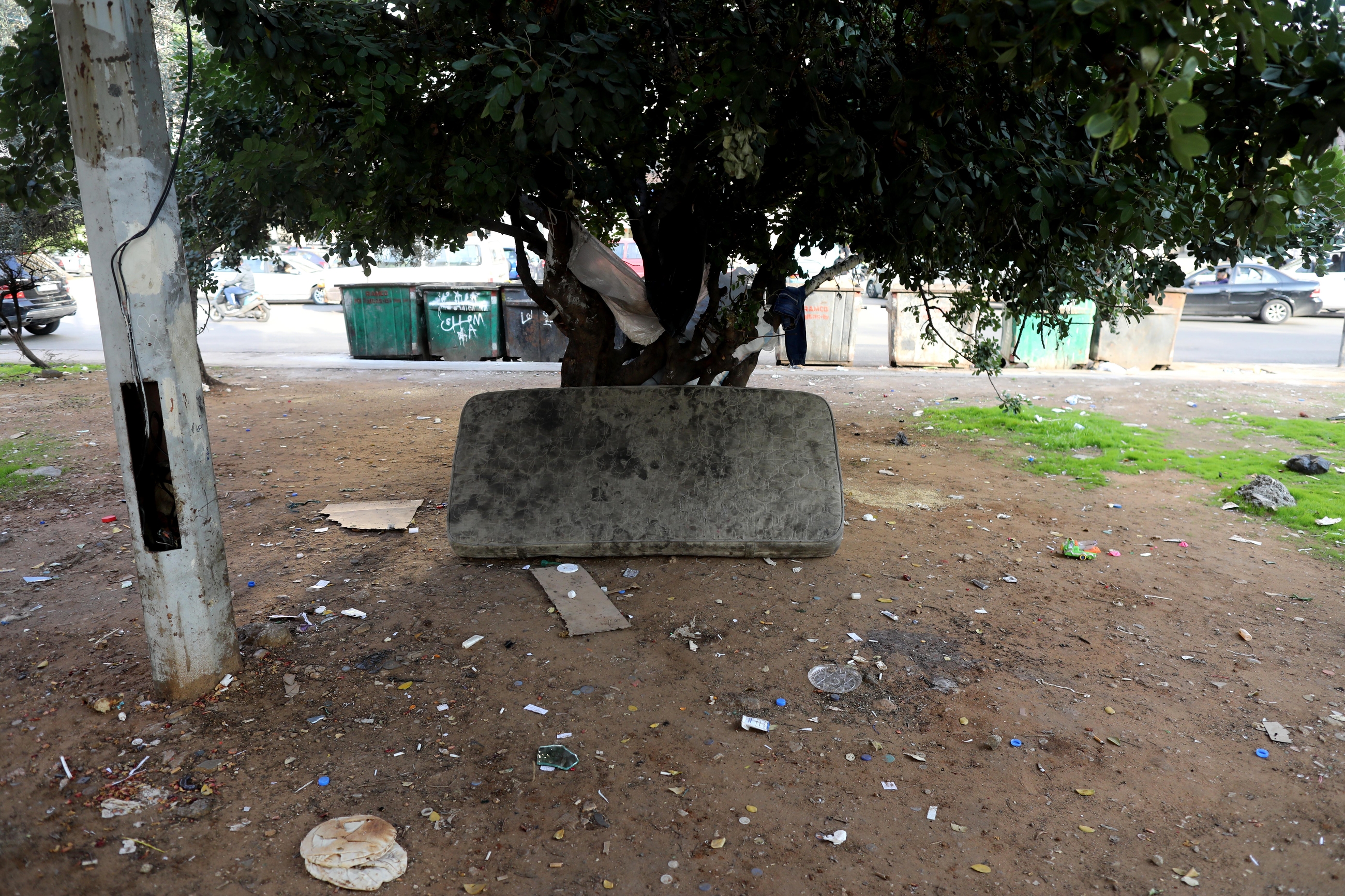
“A mattress and a sofa are the only things we use for sleeping.” – Imad Kanjo. Cola, Beirut. December 8, 2022. (Marwan Tahtah/The Public Source)
Kanjo says life under the bridge is getting worse. He suffers from stomach and liver ailments, but cannot get proper rest.
“Because I know that some thugs and drunkards might attack my girls, I try to stay up as late as possible,” he says. Along with two friends who sleep close by under the bridge, Rakan Chebli and Shadi, the men take turns guarding the children and their belongings. The children sometimes go to their mother’s apartment in Burj al-Barajneh to shower.
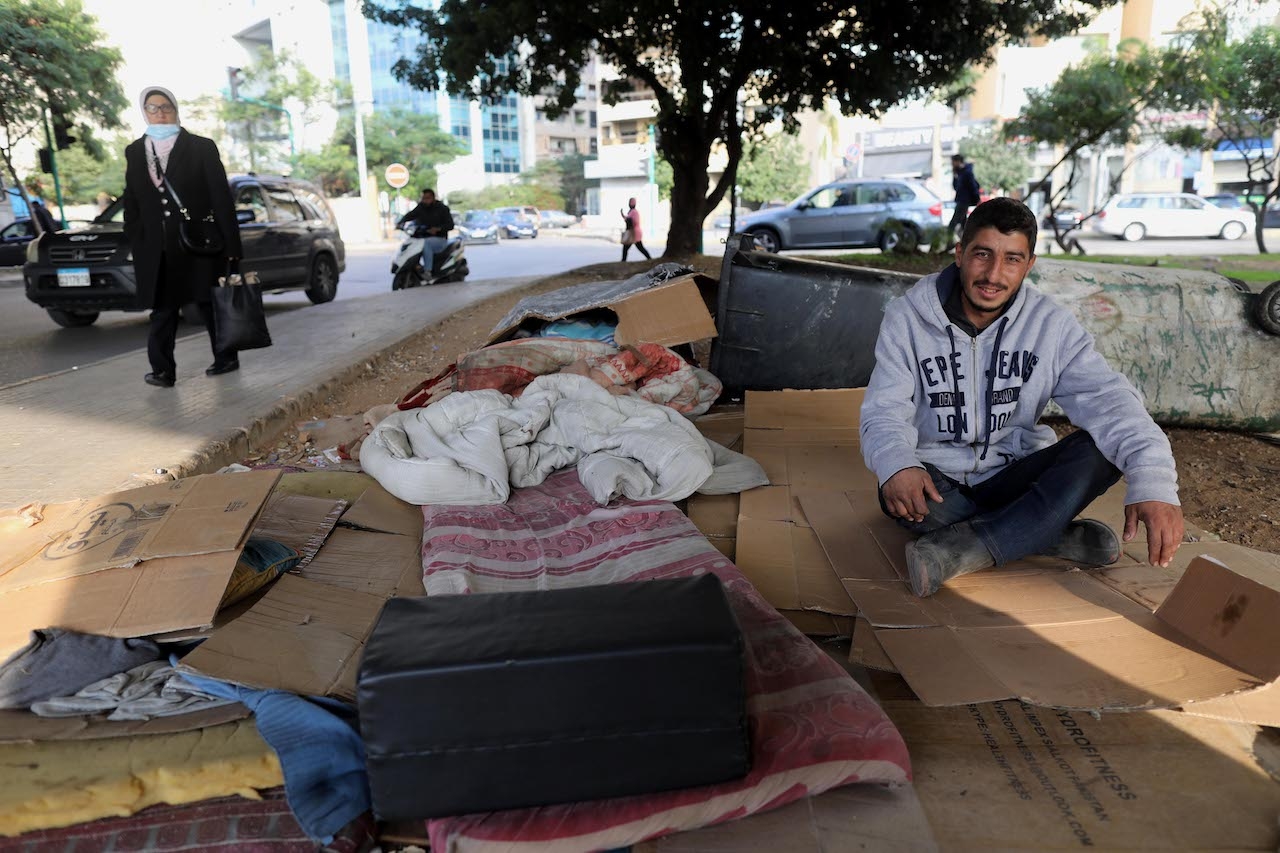
Rakan Chebli smiles at the camera as he sits on cardboard and blankets he needs for the winter. Cola, Beirut. December 8, 2022. (Marwan Tahtah/The Public Source)
Originally from Chehim, Mount Lebanon, Rakan Samih Chebli used to sell roses in Ramlet al-Bayda. But when their price skyrocketed — from 3,000 to 50,000 L.L., “no customer was willing to buy a single rose at such a high price,” says Chebli. The 27-year-old has been living under the Cola bridge since 2019.
A father of three, Chebli needs all the money he can get to feed his children, who now live with their mother and grandmother, and whom he visits once a week.
On the street, Chebli is helping raise his friend Imad Kanjo’s children. “Usually, we eat ready-made foods, such as Ramen noodles and falafel. On bad days, Kanjo’s children dig through the trash for food, but we try to support one another and be there for each other,” says Chebli. They use the toilets of a nearby cafeteria.
When he can get away, he likes to play football, a sport he is passionate about.
“I don’t believe the situation in Lebanon will get better and I’m not hopeful about finding a job anytime soon,” says Chebli. “I blame the ruling class for turning this country into a nightmare.”
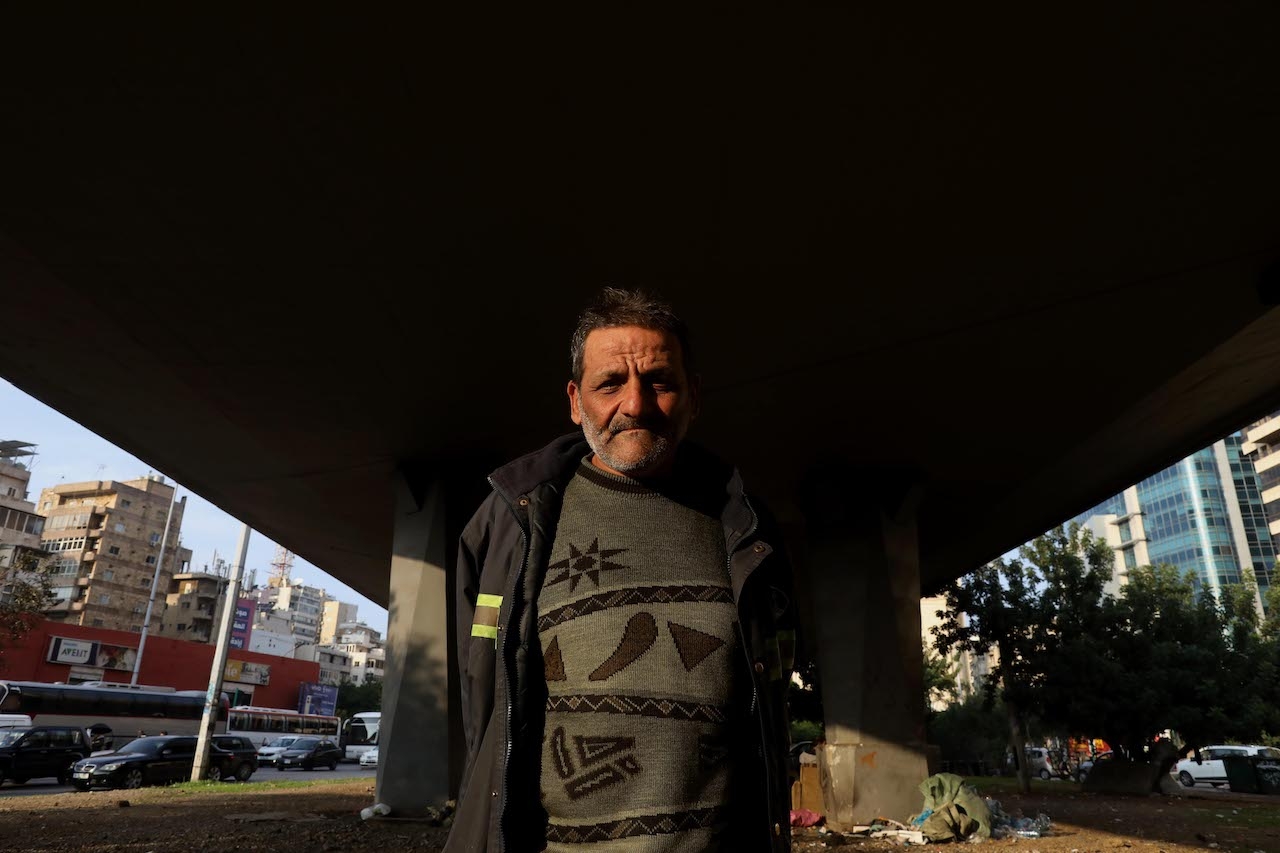
In the shadow of the Cola Bridge, Somar Al Hassan stands waiting for his photo to be taken. Cola, Beirut. December 8, 2022. (Marwan Tahtah/The Public Source)
Somar al-Hassan is one of the newest arrivals to the space under the Cola Bridge, where he has lived for little over a year. In 2007, the 73-year-old Syrian national left his wife and seven children in rural Aleppo hoping to find work as a taxi driver in Lebanon. But unable to get a permit, he resorted to selling tissues on the streets of Beirut.
Then the economic crisis hit, tissue sales stopped being minimally profitable, and al-Hassan couldn’t pay his rent of L.L. 2.5 million. His landlord evicted him.
Short of options, al-Hassan still tries to sell tissues to drivers passing through the Cola intersection. He buys six packets from a nearby store and waits for when traffic is heaviest, usually twice a day. But business is bad. For food, he mostly relies on the kindness of strangers. For warmth, he burns used cardboard boxes.
“There are some gangs who start fights, but we are careful not to get involved with them,” says al-Hassan, using the plural to refer to the friends he has made living under the bridge. “Whenever someone asks for a cigarette, we give them the whole packet if we sense them to be aggressive.”
“Because the villages around Aleppo where I’m from are still unsafe, I am unable to return to Syria,” says al-Hassan. “For now, we’ll have to make do with what we have and hope for the best in the future.”
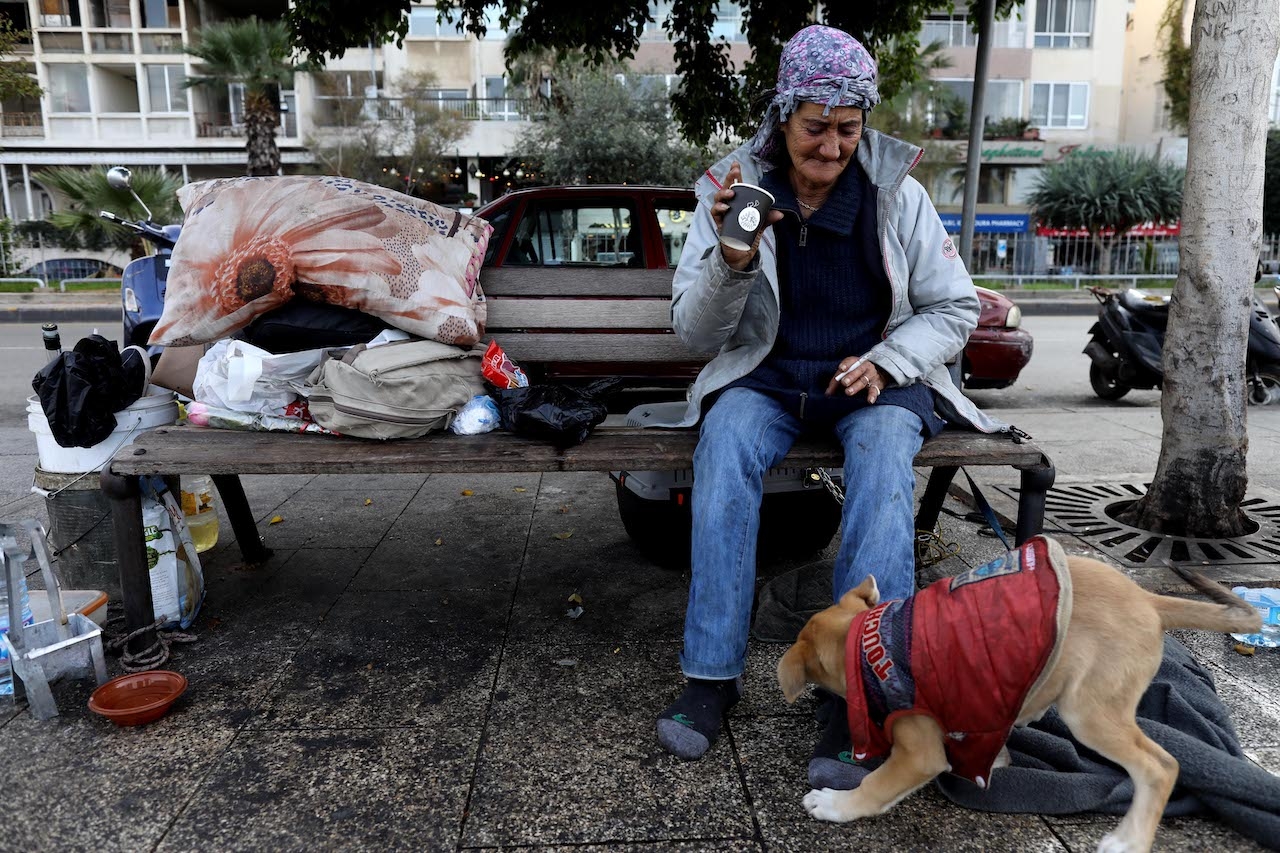
Mariam Farzat looks affectionately at her 5-month-old puppy, Bella. Ain al-Mraysse, Beirut. December 8, 2022. (Marwan Tahtah/The Public Source)
Ghosson Farzat, who prefers to go by her baptismal name, Mariam, has been living on the streets of the coastal neighborhood of Ain al-Mreisseh since 2004. Now 57 years old, she tells us she once led a comfortable life as the mother of four daughters, before her husband filed for divorce and checked her into Deir al-Salib, a psychiatric hospital.
In 2013, when her savings ran out, Farzat began to fish for a living — a skill she learned in her mid-20s. “My fingers were broken recently when I slipped by accident, so I haven’t fished in a month,” she says.
Despite her best efforts, Farzat says she cannot find an affordable apartment in Beirut. She sleeps on a bench, wakes up at her own pace, hides in the al-Omda Snack whenever thunderstorms erupt, and dreams of being reunited with her daughters one day, whom she hasn’t seen in years. She is saving up for a phone to contact them.
“Having lived here for a long time, I’ve formed close friendships with people from this area who like to bring me presents and keep me company,” she says beaming and pointing to the left side of the street. Farzat is kept company by Syrian children who sell flowers along the beach promenade and bring her hot meals cooked by their mothers. Her five-month-old puppy Bella keeps her company and guards her belongings.
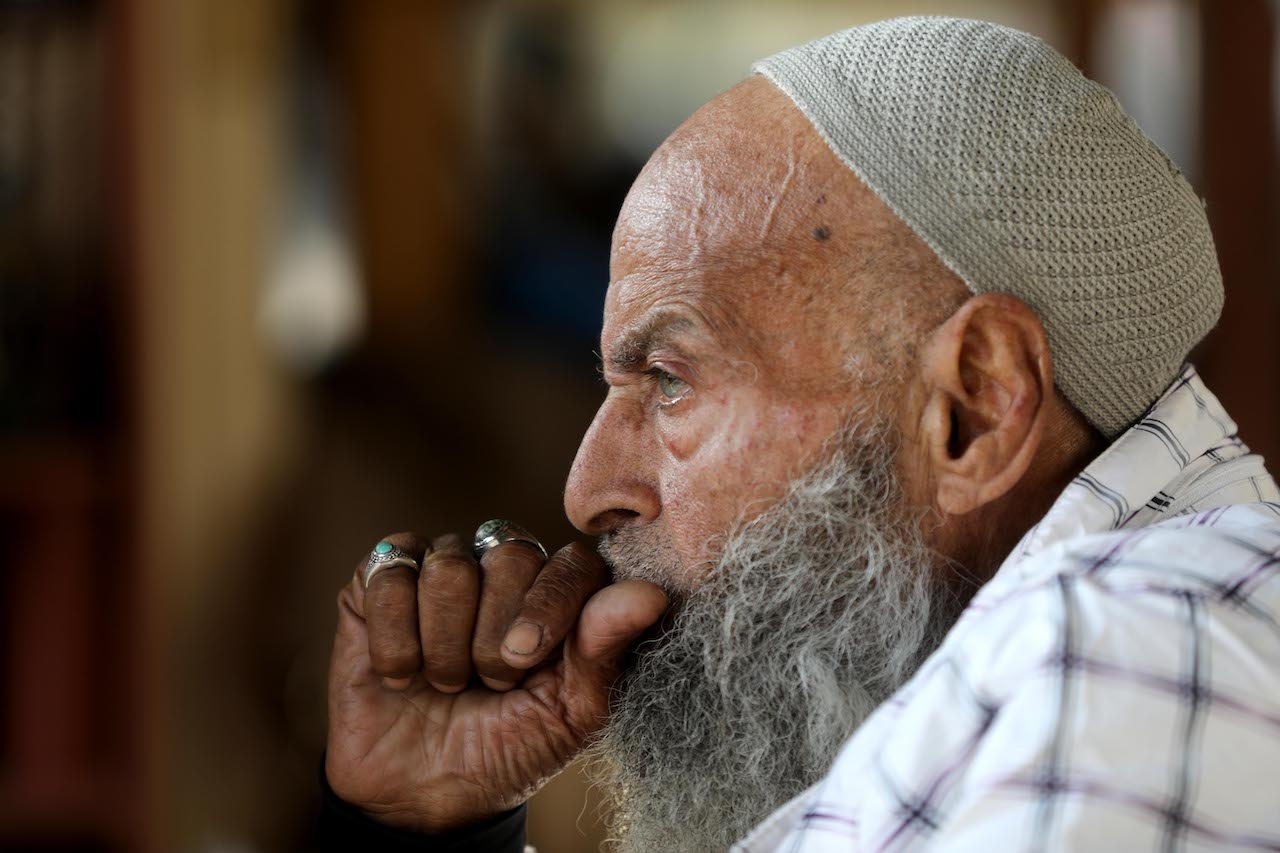
Mohammad Maghrebi pauses pensively as he talks about his bookstore. Fiat Bridge, Beirut. December 8, 2022. (Marwan Tahtah/The Public Source)
Since 2018, Mohammad Maghrabi has made himself a home under the steel bridge that separates the neighborhoods of Sin el-Fil and Achrafieh, popularly known as the Fiat Bridge. That was the year he lost his home in a dispute with the landlords. After 14 months in prison for charges of forgery, of which he claims innocence, he emerged to find the house had been demolished.
It was in prison where he first began collecting books. For the past two years, the 82-year-old Egyptian national, a graduate of Cairo University, has curated an open-air bookstore under the bridge, populated with books he buys from the Souk al-Ahad market.
“When I began selling books, I saw a burning thirst for knowledge among Lebanese,” says Maghrabi. “I have a quest to find Lebanon’s forgotten significance, culture, and history. It is too important for us to abandon it.”
Last January, Maghrabi awoke to find his collection on fire. A video of the incident went viral. Thanks to donations, he was able to restock. Parliamentarian Paula Yacoubian helped build the wooden shed where he now sleeps and keeps his belongings.
Accompanied by his dog, Betty, Maghrabi guards his books closely while conversing with potential customers. “Some of my regulars have become close friends, but I prefer to be alone than befriend anyone who could cause me harm,” he says.
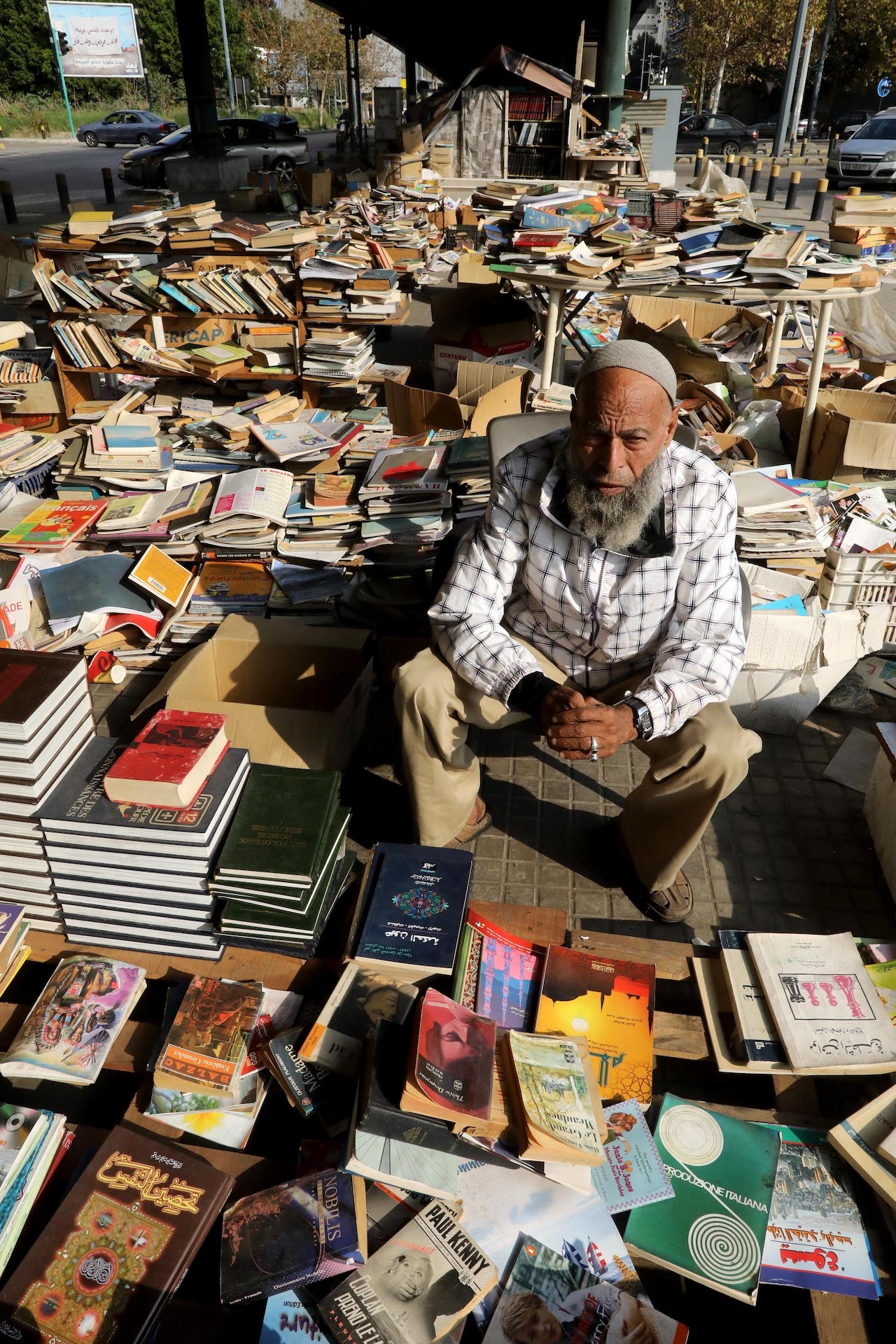
Mohammad Maghrebi sits among the piles of books he has collected for his open-air bookstore. Fiat Bridge, Beirut. December 8, 2022. (Marwan Tahtah/The Public Source)
